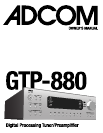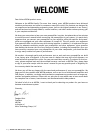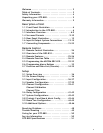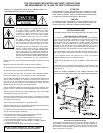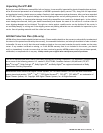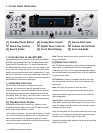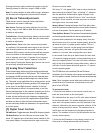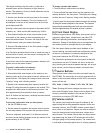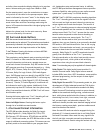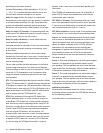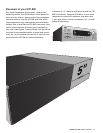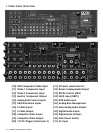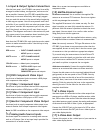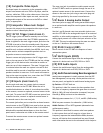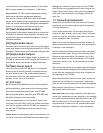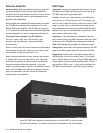
| ADCOM GTP-880 Owner’s Manual8
9ADCOM GTP-880 Owner’s Manual |
and after three seconds the display defaults to its previous
status. Volume setting can range from -80dB to +10dB.
On the remote control, press the mute button to tempo-
rarily switch off the sound to the preamp outputs. Mute
mode is indicated by the word “mute” in the display area.
Press mute again or adjusting the volume will restore
sound. Mute does not affect recordings made using the
tape or VCR outputs but does affect the signal going to the
preamp outputs.
Adjusts the volume level for the main room only. Room
two is not affected by this control.
[
9
]
Surround Mode Buttons
With the surround mode buttons the available surround
sound modes can be selected. The selected surround mode is
permanently indicated in the display area and is also shown
for three seconds in the large text section of the display.
7.1m²™ Button: Pressing this button activates ADCOM’s
proprietary decoding algorithm.
This proprietary analog-domain post-processing technique
takes 5.1 channel or other sources that have surround
channel information and extracts a psuedo-stereo sur-
round back channel information. Only DSP modes that do
NOT generate more than 2 surround channels (e.g. - Dolby
Digital, DTS, 5 Stereo, Dolby Pro Logic, Dolby Pro Logic
II Cinema, Dolby Pro Logic II Music, DVD-Audio Bypass
Input, SACD Bypass Input) can benefit from ADCOM 7.1m2
post-processing. Trying to enable ADCOM 7.1m2 during any
other DSP mode (e.g. Dolby Digital EX, DTS-ES Extended
Surround, 7 Stereo, 2 Channel Bypass) is Invalid and will
be indicated as such by the system. Additionally if the
system setup up does NOT indicate that the system setup
offers 2 surround back channels, ADCOM 7.1m2 will never
be offered as option.
Pressing this button again turns 7.1m²™ decoding off and
returns to previously selected surround mode.
Select Left/Right Button: Pressing this button cycles
through list of available surround modes.
1.4 Surround Format Information
The GTP-880 provides decoding for Dolby Pro Logic®
II, Dolby Digital® 5.1, Dolby Digital EX®, DTS®, DTS-
ES® Discrete, DTS-ES® Matrix, DTS NEO:6® and ADCOM
7.1m²™. Within each mode, the GTP-880 also offers a wide
range of additional processing options. This means you can
precisely match a surround mode to your program mate-
rial, loudspeaker setup and personal taste. In addition,
the GTP-880 precision bass management feature provides
maximum exibility when setting up your audio surround
system (see “system setup” for further details).
ADCOM 7.1m²™: ADCOM’s proprietary decoding algorithm.
The 7.1m²™ decoding process mixes the signals from the
left surround and right surround channels to derive two
unique signals sent to each back output. The benefit of
our 7.1m²™ decoding process is enhance imaging between
the surround speakers and the creation of a more diffuse
ambient sound field. The 7.1m²™ process has the same
benefits when compared to other matrix decoding as
stereo signals have over mono signals. The 7.1m²™
process can also be used to drive your surround back
speakers when you are listening to an externally decoded
DVD audio or SACD multichannel disc. Due to the varying
nature of film soundtracks and music, you may prefer to
activate or deactivate the surround back channels. For
example, Dolby Digital 5.1 and DTS soundtracks benefit
greatly from the addition of the 7.1m²™ processing.
ProLogic soundtracks on the other hand provide a mono
surround signal track, which yields a less satisfying
experience when using the surround back channels.
Note: 7.1m
2
decoding may only be applied to 5 channel signals.
Dolby Digital: This digital audio format provides 5.1-
channel surround sound. Dolby Digital source material
includes DVDs, laser discs, HDTV broadcasts, some satellite
delivered programming, and the output of some digital
cable set top boxes.
Dolby Digital Surround EX: This processing mode is a joint
development of Dolby Laboratories and the THX division
of LucasFilm, Ltd. Film soundtracks encoded with Dolby
Digital Surround EX technology contain an extra channel,
added to the soundtrack during mixing, called surround
back, which places audio behind the listener in addition to
the existing front left, front center, front right, surround
left, surround right, and subwoofer channels. This
additional channel provides more detailed imaging behind
the listener creating more depth, spacious ambience and
sound localization than before.
Note: Surround EX mode can also be engaged during the
playback of 5.1 channel material that is not Dolby Digital
Surround EX encoded. When used this way, signals from
the left and right surrounds are used to synthesize the
surround back channel. Results using this method will vary



